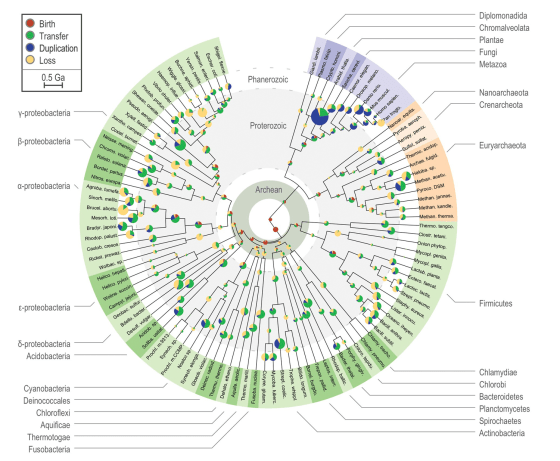The collective genome of all life on Earth today went through a rapid growth spurt between 3.3 billion and 2.8 billion years ago, according to scientists who used computer algorithms to reconstruct the evolutionary history of thousands of genes.
The growth spurt coincides with the advent of a biochemical pathway known as electron transport that is "integral for photosynthesis as well as for respiration," Lawrence David, a computational biologist at the Massachusetts Institute of Technology, told me.
He and colleague Eric Alm named this growth spurt the Archean Expansion. The expansion precedes an era known as the Great Oxidation, when oxygen began to accumulate in Earth's atmosphere and likely killed off large numbers of non-oxygen breathing life forms.
The computer model developed by David and Alm doesn't have the resolution required to show a causal link between the genetic expansion, the die-off of anaerobic life, and the emergence of bigger aerobic life forms. Nevertheless, "the timing is interesting," David noted.
"We see these genes coming online which have a lot to do with photosynthesis and metabolism, and concurrently there's a big diversification in the genetic repertoire," he said.
The research is based on the premise that DNA is a sort of living fossil, allowing scientists to peer back through time and reconstruct evolutionary histories.
"We inherit DNA from our ancestors, and so you can work backwards by looking at the genomic record in all the living organisms today to piece together what was going on in the past," David said. "That's the idea behind DNA in you an me almost being like a fossil."
To peer back in time, the researchers created family trees of closely related genes. It is similar to a family tree — with aunts, uncles and cousins — but instead of family members, the "branches" are DNA sequences from different organisms.
"What we found when we constructed these gene trees for all these different gene families is that 27 percent of the roots of these trees all seem to be dated to this period in Earth's history," David said.
Alm added in a news release that the findings prove "the histories of very ancient events are recorded in the shared DNA of living organisms. And now that we are beginning to decode that history, I have hope that we can reconstruct some of the earliest events in the evolution of life in great detail."
The findings were reported Sunday by the journal Nature. For more stories on related issues, check out the links below.
- 'Great Oxidation Event' occurred much earlier
- Earliest traces of complex life?
- Ancient animal explosion gets bigger with new finds
- Mysterious DNA survives eons of evolution
John Roach is a contributing writer for msnbc.com. Connect with the Cosmic Log community by hitting the "like" button on the Cosmic Log Facebook page or following msnbc.com's science editor, Alan Boyle, on Twitter (@b0yle).
